Have questions before you get started?
As experienced shopping cart manufacturers in China for 12 years, we warmly welcome your inquiries. We offer shopping carts wholesale and provide options to buy shopping carts for various retail needs.
12 years China Customzied Shop Fittings manufacturer
Also known as shopping trolleys or grocery shopping carts, these mobile shopping tools with wheels are used to carry shopping items for the convenience of customers. Choose JY for your shopping cart supplier; we offer many styles with an MOQ of 50 pcs. As experienced cart manufacturers with 12 years in the industry, JY shopfitting allows you to purchase our existing styles or customize your design for a custom shopping cart.
JY shopfitting have 12 years Shopping cart manufacturer experiance ,you can purchase our existing styles or customize your design.

Target shopping carts are provided to customers free of charge to put items in while shopping. They feature a strong structure, wheels, and a large basket for moving around and carrying what you buy.
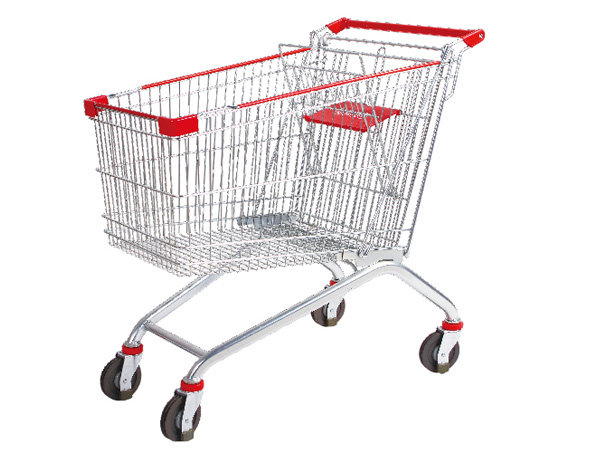
A Costco shopping cart is a large, heavy-duty cart provided by Costco for individuals to use while shopping in their warehouses. It easily handles bulk items, thanks to its durable metal frame, smooth-rolling wheels, and room for oversized products, perfect for transporting large quantities of goods on shopping trips.

Sam’s Club uses large, durable shopping carts, which makes shopping easier. Intended to hold items in excess, with a sturdy metal frame, smoothly-rolling wheels, and an extra-roomy basket for holding oversized products. Depending on the individual store, Sam’s Club members have access to flatbed carts or specialty carts with two wheels for carrying large or unusual items.
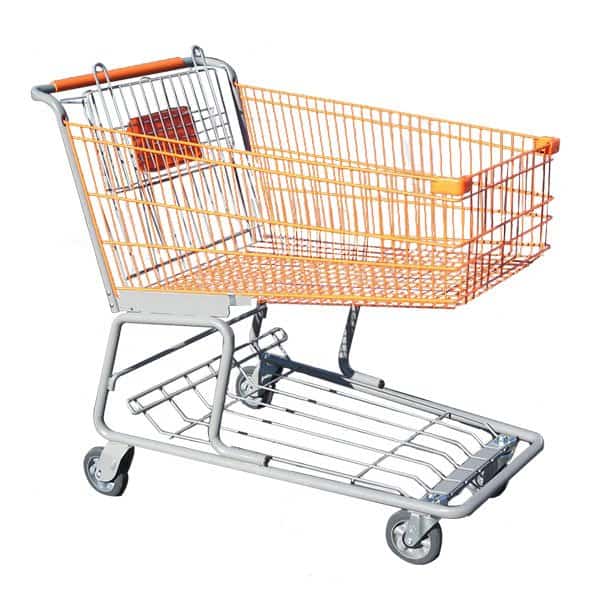
Home Depot carts are designed for carrying heavy and bulky items around hardware and home improvement stores. They have a sturdy metal frame, large wheels that roll smoothly, and a generous basket. Some models have a flatbed design to carry oversized products like lumber or appliances.

The HSN shopping cart is the HSN website’s online shopping tool; it lets users add, view, and manage the products they want to buy. The “Add to cart” feature allows users to add products, review them, apply any discounts, and complete the transaction.
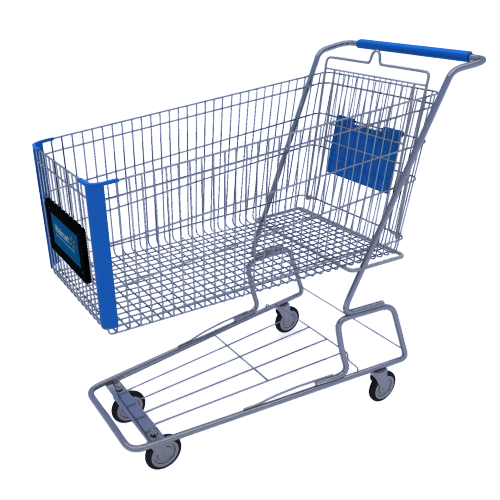
Walmart shopping carts are provided by Walmart for customer use. They have a sturdy metal or plastic frame, wheels that make it easy to roll around, and a large basket for carrying groceries, household items, and other purchases.

The TJ Maxx Shopping Cart is provided by TJ Maxx for customers to shop in its stores. It features a compact, lightweight frame with wheels for easy mobility and a basket for carrying clothes, accessories, and other items. With the eye-catching TJ Maxx logo, it fully reflects the brand value.
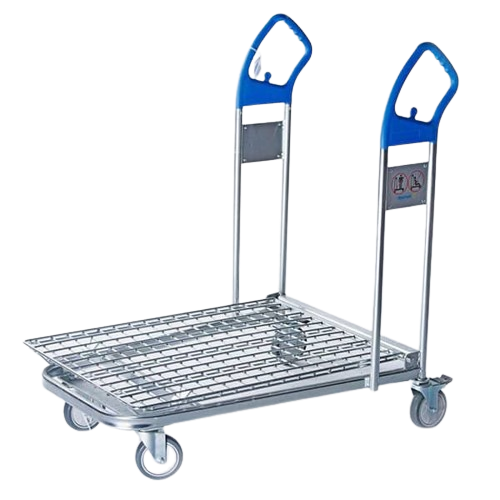
IKEA shopping cart is designed differently from other comprehensive supermarket carts. It adopts an open, flatbed design, with a sturdy chassis and wheels, which allows them to place large furniture items more conveniently and has better load-bearing capacity.
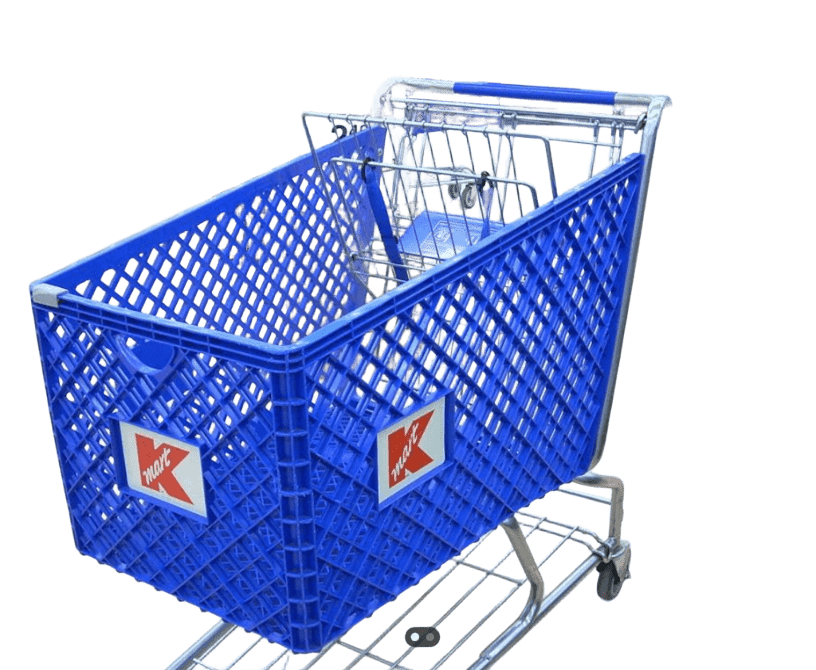
Kmart, a retail chain store, provides shopping carts (or trolleys) for customers to carry goods while shopping. Kmart shopping carts have standard specifications and designs, usually made from a metal frame and a plastic basket. They are easy to maneuver throughout different areas of the store, enabling patrons to easily grip and control the direction of the shopping cart.
shopping cart.

Ross shopping carts are provided by Ross stores for customers to use while shopping. They feature a compact, lightweight frame with wheels for easy mobility and a basket for carrying clothes, accessories, and other items. The eye-catching Ross logo fully reflects the brand value.

Metro cargo trolleys are heavy-duty wheeled carts specifically designed for transporting large or bulky items, commonly seen in warehouses, retail stores, or industrial environments. Generally, you will find a sturdy metal framework with a flatbed/rack or spacious basket for transporting goods and smooth-rolling wheels for easier movement, making it more suitable for conducive cargo handling.

Garden center shopping carts have been purposely made for customers to purchase gardening supplies, plants, and outdoor products at a garden center or nursery. These carts typically have a bigger and deeper basket and a heavy-duty frame with a wider base and larger wheels to support the weight and size of gardening-related gear.
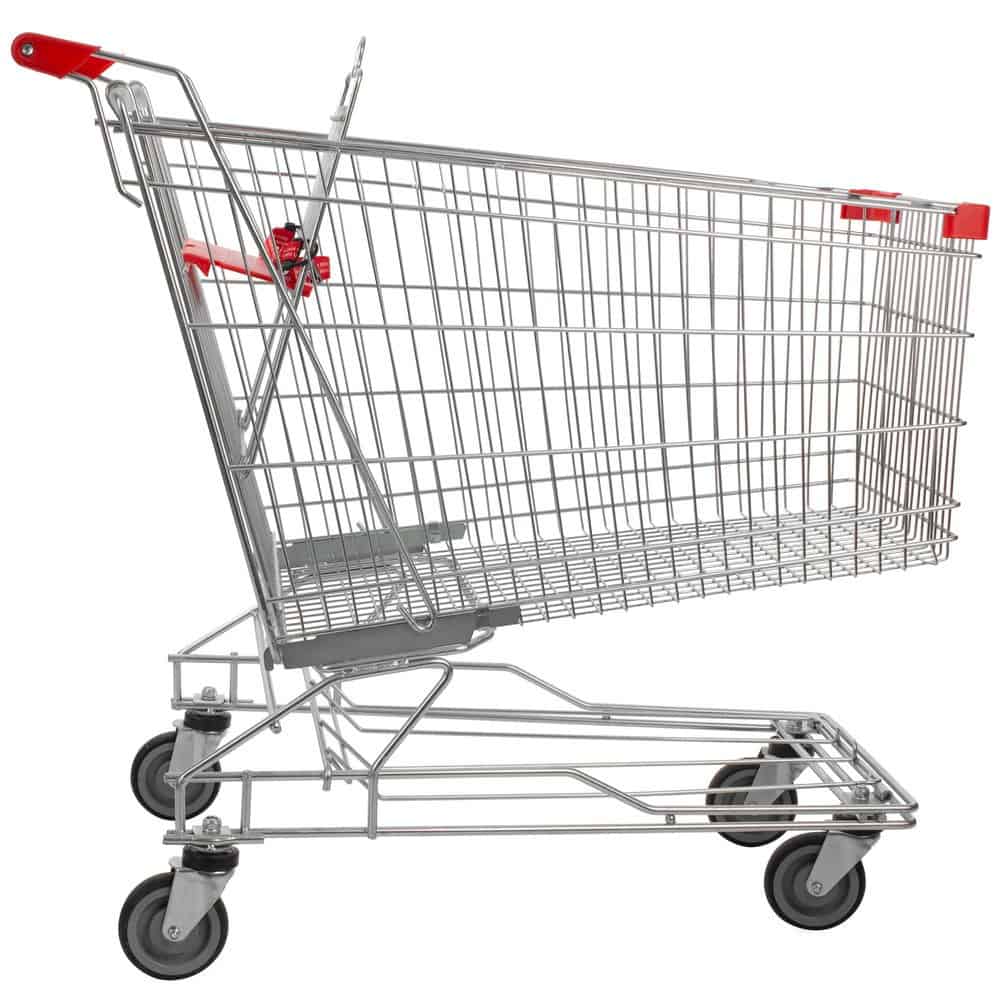
Metal shopping carts are a category of shopping carts with a body frame mainly made of metal material (namely steel) as the skeleton. Their structure is high strength and high stability, usually welded. Metal shopping carts can load heavier commodities compared to plastic ones. Steel shopping carts, used mainly in supermarkets to transport considerable weight like drinks and canned food, can withstand the weight very well without any damage.
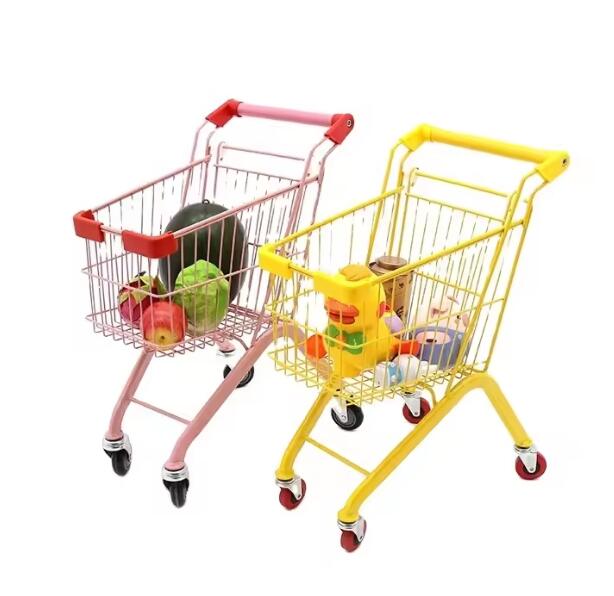
Kids’ metal shopping cart sets are miniature shopping carts intended for children. They are smaller in size compared to a normal shopping cart, with a height of about 50-80 cm, which is ideal for most children to push and operate the cart themselves. The metal part is made of light yet strong material. The design of children’s metal shopping carts often incorporates fun elements like cartoon patterns, bright colors, and other decorations. Child safety features are also a priority in these carts.

Plastic shopping carts are made primarily of plastic. One of the benefits of these carts is that they are lightweight and resist corrosion. The bulk of it, like the basket and section of the framework, is plastic injection filling. Plastic shopping carts are typically lighter and easier for customers, particularly the elderly and children, to push. Moreover, plastic materials are not easy to rust, which makes them better suited for humid environments.

Heavy-duty carts are typically found in warehouses or home improvement stores and can also be used personally. They are designed with reinforced frames, heavy-duty materials, and larger wheels for better stability and smooth movement. These carts are perfect for transporting heavy objects like appliances, construction materials, or large amounts of groceries in a way that is both easy and guaranteed.

Medium wire shopping carts are between small and large shopping carts, designed for moderate shopping needs. They usually have a well-balanced frame, a basket roomy enough for a regular shopping or retail trip, and smooth-rolling wheels for easy movement. These medium shopping carts are often used in supermarkets, convenience stores, and similar retail environments to provide a solution for carrying items around without much hassle.

A small grocery cart or small shopping cart is designed to hold only a few items when you are going to shop, used for quick trips or light purchases. It has a light frame, a small basket for your things, and wheels to move it around easily. These shopping carts are usually located in supermarkets, urban grocery stores, or convenience stores, catering to casual customers with few needs.
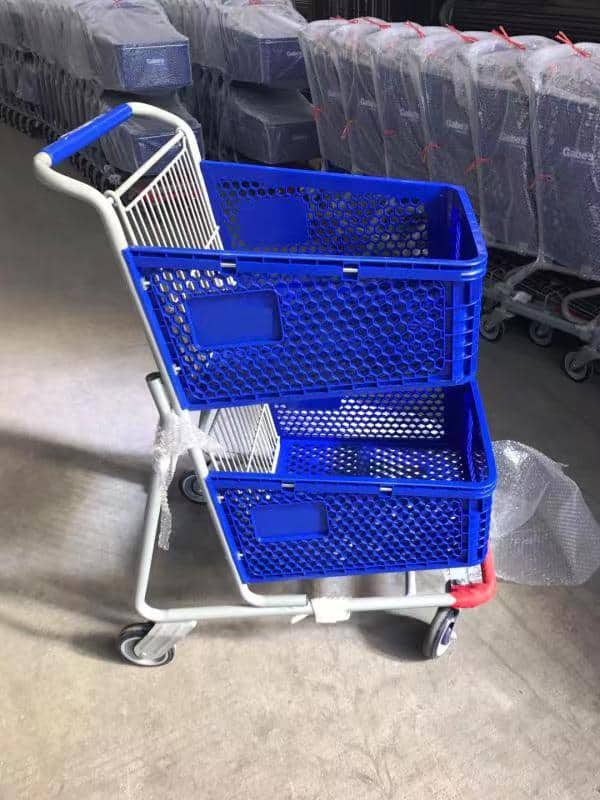
This is a two-tier shopping cart that comes with a plastic basket. The plastic baskets are lightweight, durable, and easy to clean, and the cart’s design allows for efficient use of space. With smooth-rolling wheels and a rugged frame, these carts are found in supermarkets, retail stores, stores with lower square footage, and places capable of utilizing compact mobility and organization.
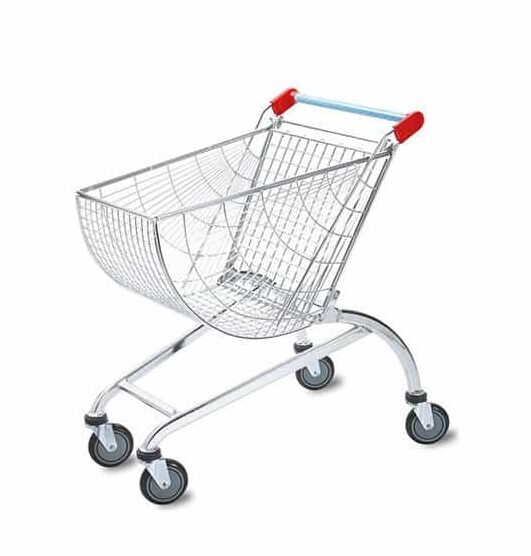
This specialized cart has a higher and wider basket that resembles the fronds of Japanese garden stones. Not only does this design maximize space efficiency, but it also looks stylish and functional. Fan-shaped shopping carts are usually used in boutique stores or specialty retail shops, where items need to be carried in a compact yet useful way. They are typically made with a durable frame and smooth-rolling wheels.

A two-tier metal shopping cart is a heavy-duty shopping trolley with metal double levels. This design helps organize items better, with the upper tier usually storing smaller or fragile products and the lower tier storing heavier or bulkier items. Designed with a sturdy structure and free-moving wheels, these carts are perfect for grocery stores, retail shops, and warehouses for effective shopping and storage.
JY Shopfitting as one of professional shopping trolley supplier have the advantages as following:
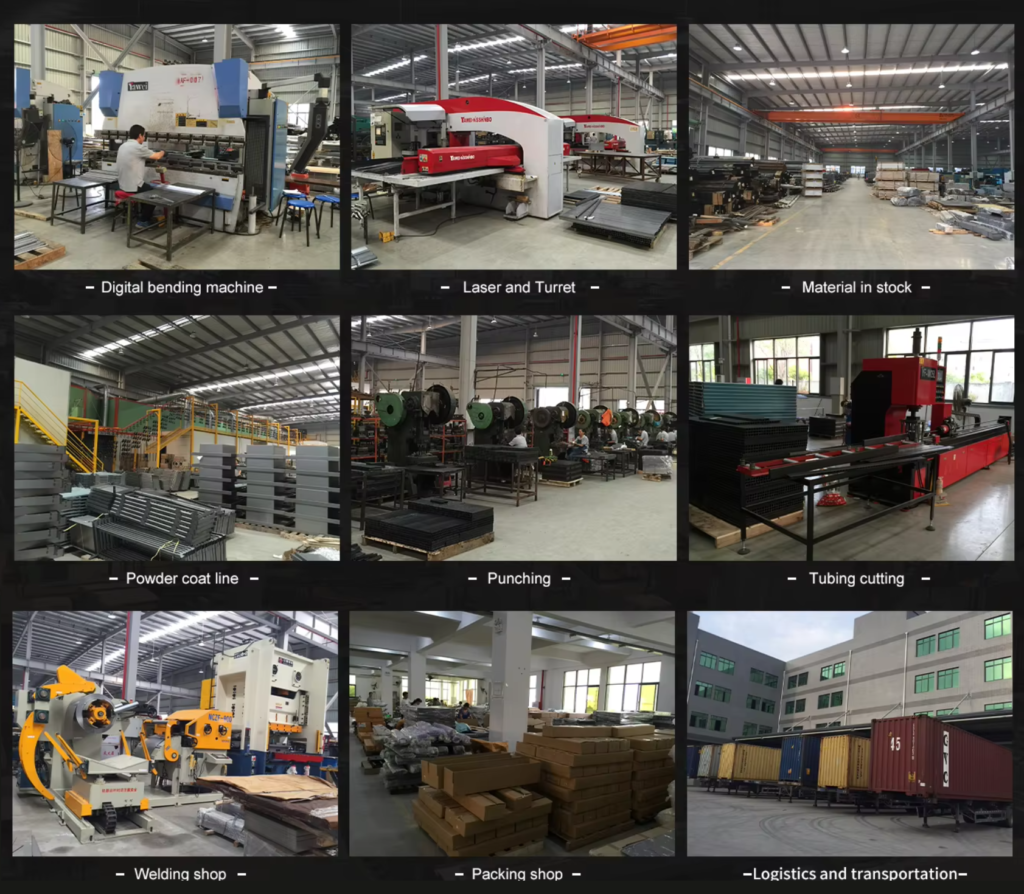
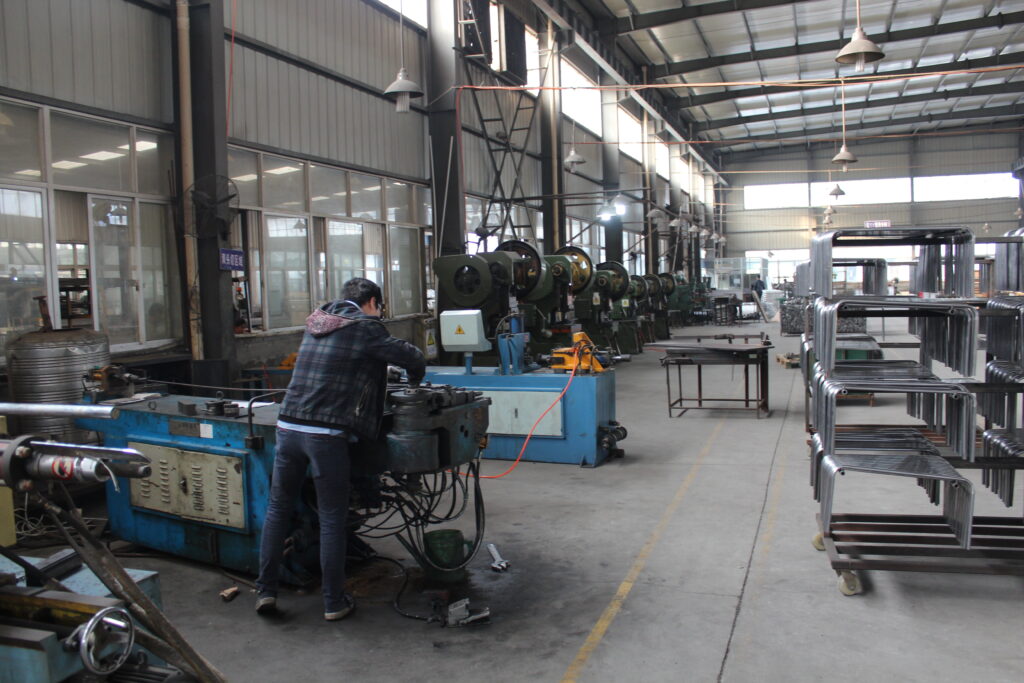
At JY shoppfitting, we provide retail customers with shopping carts made of a variety of materials, including iron and plastic. We can perform a variety of surface treatments, such as powder coating, chrome plating, and galvanizing. Our product manufacturing process includes drawing confirmation, CNC punching/laser cutting, bending, forming, MIG/TIG/laser welding, all of which are strictly inspected to ensure the highest quality. We make products with stable quality to meet your needs.

TUV Certificate

BSCI Certificate

CE
Quality is life. Strict inspection process is the key to maintaining product quality and the most important reason why our metal trolleys are popular in Europe and America.
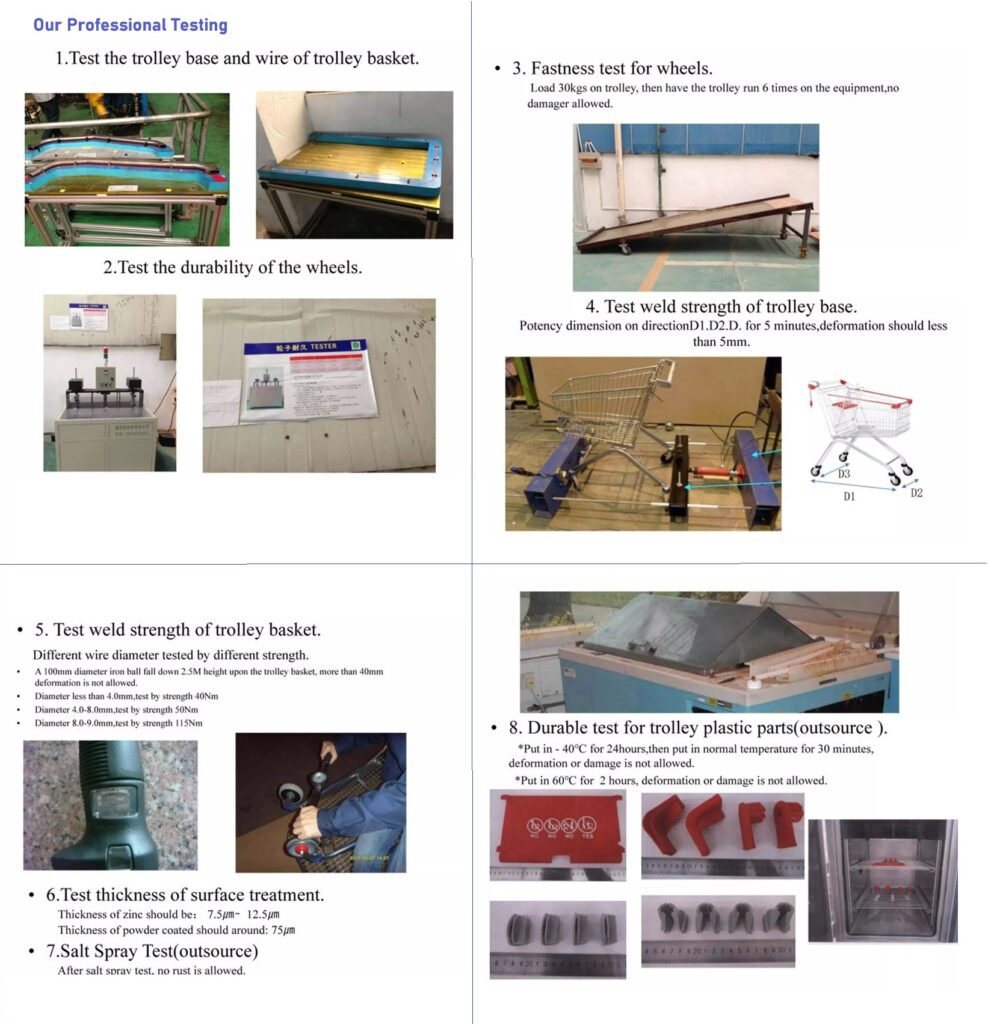
As experienced shopping cart manufacturers in China for 12 years, we warmly welcome your inquiries. We offer shopping carts wholesale and provide options to buy shopping carts for various retail needs.

Send us your drawings and get a quotation in 2 days. Experience zero-cost innovation and turn your ideas into reality! We offer custom shopping cart designs, retail store shopping carts, and even shopping carts for laundry or home use.
john@shopfittingmanufacturer.com
Additional features we offer:
Cart corrals for organized storage
Powder coated finish for durability
Chrome railing for a tubular modern look
Hand baskets and handbasket carts for smaller purchases
Our range includes wire shopping carts with wheels
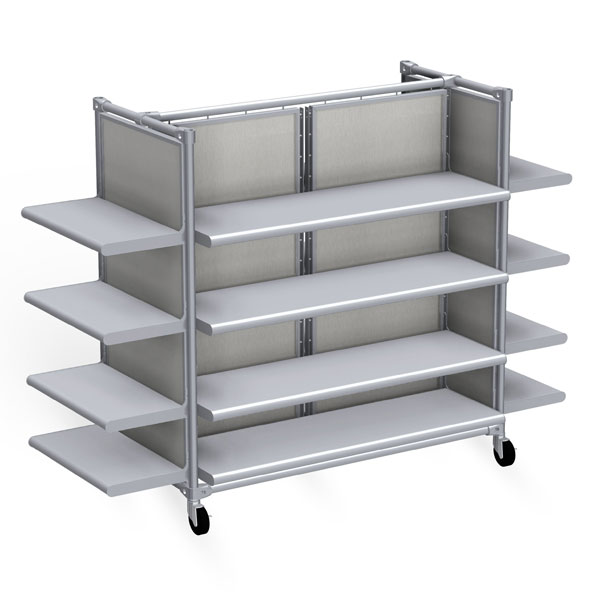
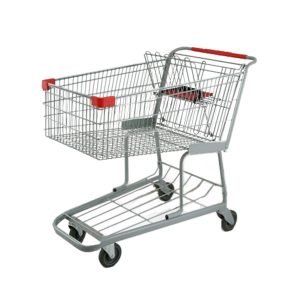
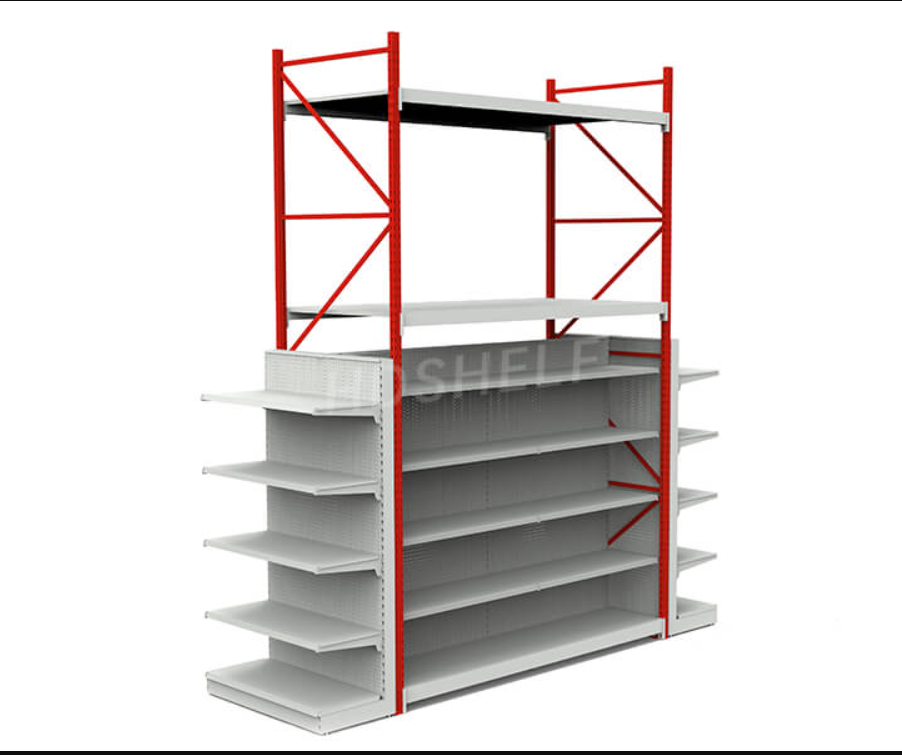
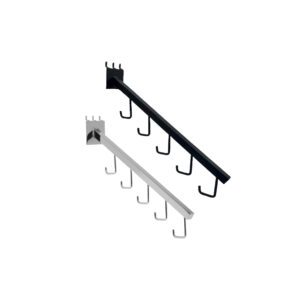
The Invention of the Shopping Cart
The story starts in 1937, with Sylvan Goldman, a grocery store owner in Oklahoma, who invented the first shopping cart. Goldman’s design was inspired by folding chairs and sought to allow customers to carry more items easily at once, driving sales and elevating the shopping experience.
The First, Simple Designֹּּּּּּּּּּּּּּּּּּּּּּּּּּּּּּּּּּּּּּּּּּּּּּּּּּּּּּּּּּּּּּּּּּּּּּּּּּּּּּּּּּּּּּּּּּּּּּּּּּּּּּּּּּּּּּּּּּּּּּּּּּּּּּּּּּּּּּּּּּּּּּּּּּּּּּּּּּּּּּּּּּּּּּּּּּּּּּּּּּּּּּּּּּּּּּּּּּּּּּּּּּּּּּּּּּּּּּּּּּּּּּּּּּּּּּּּּּּּּּּּּּּּּּּּּּּּּּּּּּּּּּּּּּּּּּּּּּּּּּּּּּּּּּּּּּּּּּּּּּּּּּּּּּּּּּּּּּּּּּּּּּּּּּּּּּּּּּּּּּּּּּּּּּּּּּּּּּּּּּּּּּּּּּּּּּּּּּּּּּּּּּּּּּּּּּּּּּּּּּּּּּּּּּּּּּּּּּּּּּּּּּּּּּּּּּּּּּּּּּּּּּּּּּּּּּּּּּּּּּּּּּּּּּּּּּּּּּּּּּּּּּּּּּּּּּּּּּּּּּּּּּּּּּּּּּּּּּּּּּּּּּּּּּּּּּּּּּּּּּּּּּּּּּּּּּּּּּּּּּּּּּּּּּּּּּּּּּּּּּּּּּּּּּּּּּּּּּּּּּּּּּּּּּּּּּּּּּּּּּּּּּּּּּּּּּּּּּּּּּּּּּּּּּּּּּּּּּּּּּּּּּּּּּּּּּּּּּּּּּּּּּּּּּּּּּּּּּּּּּּּּּּּּּּּּּּּּּּּּּּּּּּּּּּּּּּּּּּּּּּּּּּּּּּּּּּּּּּּּּּּּּּּּּּּּּּּּּּּּּּּּּּּּּּּּּּּּּּּּּּּּּּּּּּּּּּּּּּּּּּּּּּּּּּּּּּּּּּּּּּּּּּּּּּּּּּּּּּּּּּּּּּּּּּּּּּּּּּּּּּּּּּּּּּּּּּּּּּּּּּּּּּּּּּּּּּּּּּּּּּּּּּּּּּּּּּּּּּּּּּּּּּּּּּּּּּּּּּּּּּּּּּּּּּּּּּּּּּּּּּּּּּּּּּּּּּּּּּּּּּּּּּּּּּּּּּּּּּּּּּּּּּּּּּּּּּּּּּּּּּּּּּּּּּּּּּּּּּּּּּּּּּּּּּּּּּּּּּּּּּּּּּּּּּּּּּּּּּּּּּּּּּּּּּּּּּּּּּּּּּּּּּּּּּּּּּּּּּּּּּּּּּּּּּּּּּּּּּּּּּּּּּּּּּּּּּּּּּּּּּּּּּּּּּּּּּּּּּּּּּּּּּּּּּּּּּּּּּּּּּּּּּּּּּּּּּּּּּּּּּּּּּּּּּּּּּּּּּּּּּּּּּּּּּּּּּּּּּּּּּּּּּּּּּּּּּּּּּּּּּּּּּּּּּּּּּּּּּּּּּּּּּּּּּּּּּּּּּּּּּּּּּּּּּּּּּּּּּּּּּּּּּּּּּּּּּּּּּּּּּּּּּּּּּּּּּּּּּּּּּּּּּּּּּּּּּּּּּּּּּּּּּּּּּּּּּּּּּּּּּּּּּּּּּּּּּּּּּּּּּּּּּּּּּּּּּּּּּּּּּּּּּּּּּּּּּּּּּּּּּּּּּּּּּּּּּּּּּּּּּּּּּּּּּּּּּּּּּּּּּּּּּּּּּּּּּּּּּּּּּּּּּּּּּּּּּּּּּּּּּּּּּּּּּּּּּּּּּּּּּּּּּּּּּּּּּּּּּּּּּּּּּּּּּּּּּּּּּּּּּּּּּּּּּּּּּּּּּּּּּּּּּּּּּּּּּּּּּּּּּּּּּּּּּּּּּּּּּּּּּּּּּּּּּּּּּּּּּּּּּּּּּּּּּּּּּּּּּּּּּּּּּּּּּּּּּּּּּּּּּּּּּּּּּּּּּּּּּּּּּּּּּּּּּּּּּּּּּּּּּּּּּּּּּּּּּּּּּּּּּּּּּּּּּּּּּּּּּּּּּּּּּּּּּּּּּּּּּּּּּּּּּּּּּּּּּּּּּּּּּּּּּּּּּּּּּּּּּּּּּּּּּּּּּּּּּּּּּּּּּּּּּּּּּּּּּּּּּּּּּּּּּּּּּּּּּּּּּּּּּּּּּּּּּּּּּּּּּּּּּּּּּּּּּּּּּּּּּּּּּּּּּּּּּּּּּּּּּּּּּּּּּּּּּּּּּּּּּּּּּּּּּּּּּּּּּּּּּּּּּּּּּּּּּּּּּּּּּּּּּּּּּּּּּּּּּּּּּּּּּּּּּּּּּּּּּּּּּּּּּּּּּּּּּּּּּּּּּּּּּּּּּּּּּּּּּּּּּּּּּּּּּּּּּּּּּּּּּּּּּּּּּּּּּּּּּּּּּּּּּּּּּּּּּּּּּּּּּּּּּּּּּּּּּּּּּּּּּּּּּּּּּּּּּּּּּּּּּּּּּּּּּּּּּּּּּּּּּּּּּּּּּּּּּּּּּּּּּּּּּּּּּּּּּּּּּּּּּּּּּּּּּּּּּּּּּּּּּּּּּּּּּּּּּּּּּּּּּּּּּּּּּּּּּּּּּּּּּּּּּּּּּּּּּּּּּּּּּּּּּּּּּּּּּּּּּּּּּּּּּּּּּּּּּּּּּּּּּּּּּּּּּּּּּּּּּּּּּּּּּּּּּּּּּּּּּּּּּּּּּּּּּּּּּּּּּּּּּּּּּּּּּּּּּּּּּּּּּּּּּּּּּּּּּּּּּּּּּּּּּּּּּּּּּּּּּּּּּּּּּּּּּּּּּּּּּּּּּּּּּּּּּּּּּּּּּּּּּּּּּּּּּּּּּּּּּּּּּּּּּּּּּּּּּּּּּּּּּּּּּּּּּּּּּּּּּּּּּּּּּּּּּּּּּּּּּּּּּּּּּּּּּּּּּּּּּּּּּּּּּּּּּּּּּּּּּּּּּּּּּּּּּּּּּּּּּּּּּּּּּּּּּּּּּּּּּּּּּּּּּּּּּּּּּּּּּּּּּּּּּּּּּּּּּּּּּּּּּּּּּּּּּּּּּּּּּּּּּּּּּּּּּּּּּּּּּּּּּּּּּּּּּּּּּּּּּּּּּּּּּּּּּּּּּּּּּּּּּּּּּּּּּּּּּּּּּּּּּּּּּּּּּּּּּּּּּּּּּּּּּּּּּּּּּּּּּּּּּּּּּּּּּּּּּּּּּּּּּּּּּּּּּּּּּּּּּּּּּּּּּּּּּּּּּּּּּּּּּּּּּּּּּּּּּּּּּּּּּּּּּּּּּּּּּּּּּּּּּּּּּּּּּּּּּּּּּּּּּּּּּּּּּּּּּּּּּּּּּּּּּּּּּּּּּּּּּּּּּּּּּּּּּּּּּּּּּּּּּּּּּּּּּּּּּּּּּּּּּּּּּּּּּּּּּּּּּּּּּּּּּּּּּּּּּּּּּּּּּּּּּּּּּּּּּּּּּּּּּּּּּּּּּּּּּּּּּּּּּּּּּּּּּּּּּּּּּּּּּּּּּּּּּּּּּּּּּּּּּּּּּּּּּּּּּּּּּּּּּּּּּּּּּּּּּּּּּּּּּּּּּּּּּּּּּּּּּּּּּּּּּּּּּּּּּּּּּּּּּּּּּּּּּּּּּּּּּּּּּּּּּּּּּּּּּּּּּּּּּּּּּּּּּּּּּּּּּּּּּּּּּּּּּּּּּּּּּּּּּּּּּּּּּּּּּּּּּּּּּּּּּּּּּּּּּּּּּּּּּּּּּּּּּּּּּּּּּּּּּּּּּּּּּּּּּּּּּּּּּּּּּּּּּּּּּּּּּּּּּּּּּּּּּּּּּּּּּּּּּּּּּּּּּּּּּּּּּּּּּּּּּּּּּּּּּּּּּּּּּּּּּּּּּּּּּּּּּּּּּּּּּּּּּּּּּּּּּּּּּּּּּּּּּּּּּּּּּּּּּּּּּּּּּּּּּּּּּּּּּּּּּּּּּּּּּּּּּּּּּּּּּּּּּּּּּּּּּּּּּּּּּּּּּּּּּּּּּּּּּּּּּּּּּּּּּּּּּּּּּּּּּּּּּּּּּּּּּּּּּּּּּּּּּּּּּּּּּּּּּּּּּּּּּּּּּּּּּּּּּּּּּּּּּּּּּּּּּּּּּּּּּּּּּּּּּּּּּּּּּּּּּּּּּּּּּּּּּּּּּּּּּּּּּּּּּּּּּּּּּּּּּּּּּּּּּּּּּּּּּּּּּּּּּּּּּּּּּּּּּּּּּּּּּּּּּּּּּּּּּּּּּּּּּּּּּּּּּּּּּּּּּּּּּּּּּּּּּּּּּּּּּּּּּּּּּּּּּּּּּּּּּּּּּּּּּּּּּּּּּּּּּּּּּּּּּּּּּּּּּּּּּּּּּּּּּּּּּּּּּּּּּּּּּּּּּּּּּּּּּּּּּּּּּּּּּּּּּּּּּּּּּּּּּּּּּּּּּּּּּּּּּּּּּּּּּּּּּּּּּּּּּּּּּּּּּּּּּּּּּּּּּּּּּּּּּּּּּּּּּּּּּּּּּּּּּּּּּּּּּּּּּּּּּּּּּּּּּּּּּּּּּּּּּּּּּּּּּּּּּּּּּּּּּּּּּּּּּּּּּּּּּּּּּּּּּּּּּּּּּּּּּּּּּּּּּּּּּּּּּּּּּּּּּּּּּּּּּּּּּּּּּּּּּּּּּּּּּּּּּּּּּּּּּּּּּּּּּּּּּּּּּּּּּּּּּּּּּּּּּּּּּּּּּּּּּּּּּּּּּּּּּּּּּּּּּּּּּּּּּּּּּּּּּּּּּּּּּּּּּּּּּּּּּּּּּּּּּּּּּּּּּּּּּּּּּּּּּּּּּּּּּּּּּּּּּּּּּּּּּּּּּּּּּּּּּּּּּּּּּּּּּּּּּּּּּּּּּּּּּּּּּּּּּּּּּּּּּּּּּּּּּּּּּּּּּּּּּּּּּּּּּּּּּּּּּּּּּּּּּּּּּּּּּּּּּּּּּּּּּּּּּּּּּּּּּּּּּּּּּּּּּּּּּּּּּּּּּּּּּּּּּּּּּּּּּּּּּּּּּּּּּּּּּּּּּּּּּּּּּּּּּּּּּּּּּּּּּּּּּּּּּּּּּּּּּּּּּּּּּּּּּּּּּּּּּּּּּּּּּּּּּּּּּּּּּּּּּּּּּּּּּּּּּּּּּּּּּּּּּּּּּּּּּּּּּּּּּּּּּּּּּּּּּּּּּּּּּּּּּּּּּּּּּּּּּּּּּּּּּּּּּּּּּּּּּּּּּּּּּּּּּּּּּּּּּּּּּּּּּּּּּּּּּּּּּּּּּּּּּּּּּּּּּּּּּּּּּּּּּּּּּּּּּּּּּּּּּּּּּּּּּּּּּּּּּּּּּּּּּּּּּּּּּּּּּּּּּּּּּּּּּּּּּּּּּּּּּּּּּּּּּּּּּּּּּּּּּּּּּּּּּּּּּּּּּּּּּּּּּּּּּּּּּּּּּּּּּּּּּּּּּּּּּּּּּּּּּּּּּּּּּּּּּּּּּּּּּּּּּּּּּּּּּּּּּּּּּּּּּּּּּּּּּּּּּּּּּּּּּּּּּּּּּּּּּּּּּּּּּּּּּּּּּּּּּּּּּּּּּּּּּּּּּּּּּּּּּּּּּּּּּּּּּּּּּּּּּּּּּּּּּּּּּּּּּּּּּּּּּּּּּּּּּּּּּּּּּּּּּּּּּּּּּּּּּּּּּּּּּּּּּּּּּּּּּּּּּּּּּּּּּּּּּּּּּּּּּּּּּּּּּּּּּּּּּּּּּּּּּּּּּּּּּּּּּּּּּּּּּּּּּּּּּּּּּּּּּּּּּּּּּּּּּּּּּּּּּּּּּּּּּּּּּּּּּּּּּּּּּּּּּּּּּּּּּּּּּּּּּּּּּּּּּּּּּּּּּּּּּּּּּּּּּּּּּּּּּּּּּּּּּּּּּּּּּּּּּּּּּּּּּּּּּּּּּּּּּּּּּּּּּּּּּּּּּּּּּּּּּּּּּּּּּּּּּּּּּּּּּּּּּּּּּּּּּּּּּּּּּּּּּּּּּּּּּּּּּּּּּּּּּּּּּּּּּּּּּּּּּּּּּּּּּּּּּּּּּּּּּּּּּּּּּּּּּּּּּּּּּּּּּּּּּּּּּּּּּּּּּּּּּּּּּּּּּּּּּּּּּּּּּּּּּּּּּּּּּּּּּּּּּּּּּּּּּּּּּּּּּּּּּּּּּּּּּּּּּּּּּּּּּּּּּּּּּּּּּּּּּּּּּּּּּּּּּּּּּּּּּּּּּּּּּּּּּּּּּּּּּּּּּּּּּּּּּּּּּּּּּּּּּּּּּּּּּּּּּּּּּּּּּּּּּּּּּּּּּּּּּּּּּּּּּּּּּּּּּּּּּּּּּּּּּּּּּּּּּּּּּּּּּּּּּּּּּּּּּּּּּּּּּּּּּּּּּּּּּּּּּּּּּּּּּּּּּּּּּּּּּּּּּּּּּּּּּּּּּּּּּּּ
Goldman’s first design consisted of a metal frame on wheels, holding two wire baskets. It was practical, but it wasn’t an instant success. Shoppersto, especially women, initially balked at using carts, believing they looked like baby strollers and wondering whether they were that helpful.
Well, this is the golden age of supermarkets.
The boom of supermarkets in the years after World War II made the shopping cart a necessity. The increasing prevalence of self-service shopping also meant shoppers needed a way to carry items, and carts were the ideal solution. By the 1950s, they were a retail staple.
Decades of Design Enhancements
The shopping cart evolved quite a bit over the years. Designers incorporated child seats, swivel wheels, even more capacious basket shapes, improving the ergonomics of the carts. These innovations made shopping easier and more enjoyable.
Foldable Bucket Type Carts
Foldable carts changed how we store and move things around. They made space-saving easier for retailers, and enhanced logistics efficiency. It was particularly valuable for small stores and urban retail spaces.
The Shopping Cart Goes Digital
The e-commerce boom brought the terms “shopping cart” into the digital world. Online carts resembled their in-store siblings, allowing users to “place” items for purchase. This online shopping equivalent helped cement the cart’s place in contemporary shopping culture.
Sustainability in Cart Design
As concerns over the environment grew, retailers looked for greener carts. There are designs with recycled materials, lightweight metals and even biodegradable plastics. These initiatives help to lower the cart’s carbon footprint.
The Future Of Shopping: Smart Carts
A cart that scans items, calculates your bill, and even guides you through the store! Smart carts are a few versions away from realizing their potential. These carts make it easier, faster and more convenient to shop for groceries by using AI technology.
The Evolutionary Impact of Materials
The material for a shopping cart has also seen its evolution from wood models to stainless steel and heavy-duty plastics. Each new material had its own advantages in terms of durability, cost, and ease of use.
Shopping Carts as Part of the Culture
Going beyond their means of functionality, shopping carts became an icon of culture. They show up in art, photography and even social commentary, signifying consumerism and modern life.
Challenges and Innovations
Retailers have to deal with issues such as cart theft, maintenance, and lost or abandoned carts. Technological innovations such as GPS tracking and anti-theft devices effectively address these challenges.
Impact on Consumer Behavior
Did you know shopping carts affect how much you buy? Research has found that bigger carts yield bigger buys. This psychological phenomenon, is a game changer for retailers.
International reception and variations
The basic idea has not changed, but carts differ across the globe. European trolleys, for example, are often made with a coin deposit, whereas Asian markets preferred a compact design made for smaller stores.
Evolution and Trends in Shopping Cart Design
“We can expect that shopping carts will continue to evolve with more tech integration, sustainability, and adaptability to the ever-changing needs of consumers in the future. There will probably be more ergonomic designs and smarter features soon.
Conclusion: A Sign of Convenience
From single baskets to high-level design, the shopping cart has evolved with our needs. It’s a lot more than a tool: it’s a sign of convenience and innovation. The next time you pick up a cart, appreciate the fascinating journey that delivered it to your hands.
Common shopping cart materials used in retail stores
Metal shopping cart: Tough and Pretty
The characteristics of metal shopping carts are that they are expensive, can bear a high weight, and are durable. They are generally used in comprehensive supermarkets, or professional supermarkets such as hardware, building materials, gardening, and tools, and can accommodate more and heavier products.
Plastic Shopping Cart: Inexpensive and Light
The characteristics of plastic shopping carts are that they are cheap, light in weight, rich in colors and can be printed with large logos. They are generally used in small supermarkets, small gift supermarkets, and snack supermarkets.
We, JY, are a professional manufacturer of shopping carts. We have 3 production lines for shopping carts. We produce shopping carts very quickly through assembly lines. We produce 150 shopping carts per day.
The shopping cart was first invented on June 4, 1937 by Sylvan Goldman, owner of the Humpty Dumpty supermarket chain in Oklahoma City, USA. It was used in grocery stores to help shoppers carry more items while shopping, increasing convenience and sales.
1. If you are a supermarket owner
Wholesale suppliers: Contact wholesale dealers that specialize in supermarket equipment. They offer shopping carts in bulk, often at a discount.
Examples: Costco Business Center, WebstaurantStore.
Buy directly from manufacturers: Manufacturers such as Unarco Industries or Wanzl can provide custom shopping carts designed for your store’s brand or unique needs.
Same-day shopping cart craftsmen like JY can save 20-30% on costs compared to Wanzl
2. If you are a wholesaler
Global suppliers: Contact manufacturers or exporters directly, especially in countries such as China, which are known for cost-effective manufacturing.
Examples: Websites such as Made-in-China or Alibaba provide direct manufacturer contacts.
Trade shows: Attend trade shows such as the National Retail Federation (NRF) or the China Canton Fair to build relationships with multiple suppliers.
Factory partnerships: Partner with shopping cart factories such as JY shopping to sign long-term supply contracts.
3. If you are an individual buyer
Local stores: Home improvement stores like Home Depot or Lowe’s sell small shopping carts suitable for personal use.
Online marketplaces: Amazon, eBay, and Walmart offer shopping carts of various sizes to suit individual needs.
Used options: Check out platforms like Craigslist or Facebook Marketplace to buy used shopping carts at lower prices.
Functionality and Innovation
Modern shopping carts integrate a variety of features to improve functionality and user experience:
Child seats: Many shopping carts come with folding seats for young children, increasing safety and convenience for parents.
Cup and phone holders: These new additions cater to the needs of modern shoppers, allowing them to multitask and stay hydrated.
Built-in scanners and digital displays: Some high-tech shopping carts now come with integrated barcode scanners and screens, allowing customers to track their spending and easily find product information.
Materials and Durability
The materials used in shopping carts continue to evolve to improve durability and longevity. Traditional metal shopping carts are strong and durable for heavy loads, while plastic shopping carts are lightweight and resistant to weather and wear. Hybrid designs combine the strength of metal with the versatility of plastic to achieve the best of both worlds.
JY has over a decade of providing one-stop metal shop fixture solution for all industry needs. With rich experience¸ we have a deep understanding about the unique challenges and requirements of our customers.